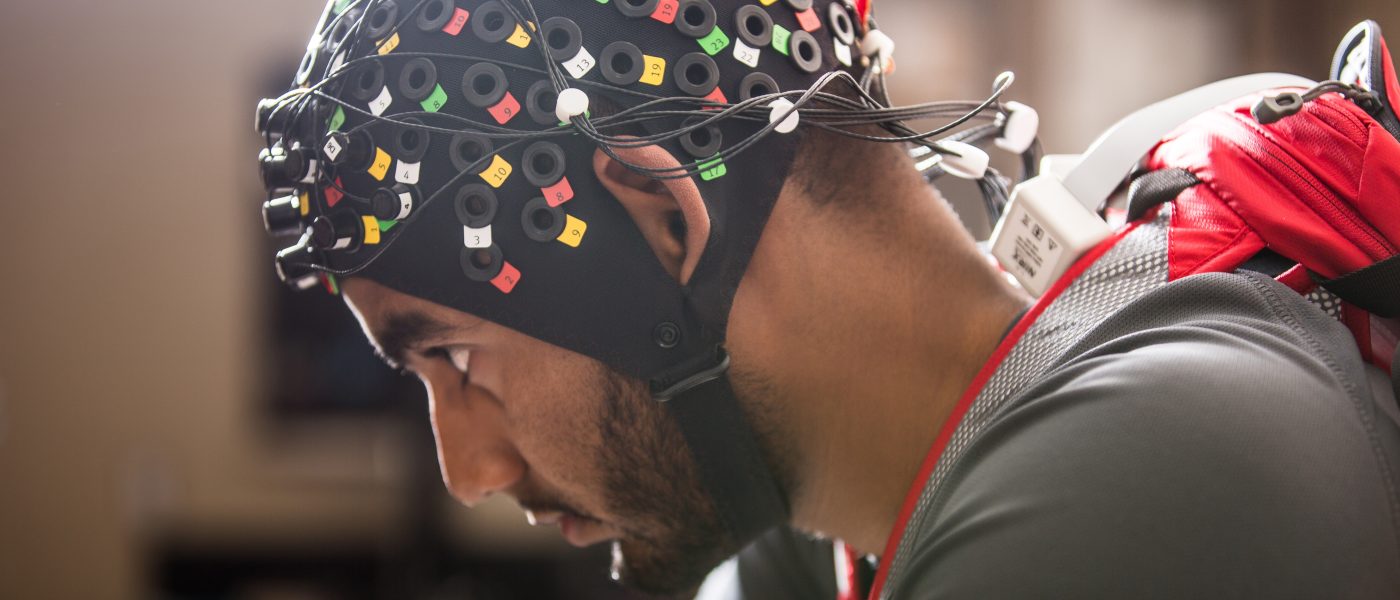Neuroscience & Behaviour
Faculty who study Neuroscience and Behaviour are broadly interested in the structure and function of the nervous system, and the interactions among physical activity and psychological factors such as emotion, cognition and motivation.
Areas of specific focus include self-regulation, behaviour change, decision making, cognitive neuroscience, memory and attention, neural plasticity, brain function, mental health, motor behaviour and gender.
Research methods and techniques include transcranial magnetic stimulation, functional magnetic resonance imaging, electromyography, eletrcoencephalography, eye tracking, metabolic measurements and field-based research.
Information Box Group
Steve Bray
Professor
My research examines social-cognitive factors that influence and are influenced by participation in physical activity. Current interests include self-perceptions such as self-efficacy, perceived control, self-regulation, and self-determination. I also investigate people’s perceptions about influential others who interact with them (proxy agents) in their pursuit of behavioural objectives. Understanding relationships between these perceptions and behaviour involves laboratory and field-based research. Challenges faced by people navigating life transitions such as moving away from home to attend college or university, rehabilitating from illness, and becoming a parent are of particular interest.
Michael Carter
Assistant Professor
Movement is undoubtedly a critical aspect of everyday human life and as such, understanding how humans plan, control, and learn skilled actions is an important line of inquiry for both basic and applied research. Research in the Memory, Action, and Cognition Lab at McMaster University aims to understand the cognitive and neural mechanisms subserving motor learning, with an emphasis on the role of errors, strategies, and the information learners selectively extract for action. This research is investigated using a multidisciplinary and collaborative approach that combines behavioural and neurophysiological techniques. Our findings are relevant for advancing fundamental knowledge regarding motor learning and informing practices in the areas of rehabilitation and coaching. For more information about current research projects, please visit the lab website.
Jennifer Heisz
Associate Professor; Canada Research Chair (Tier 2); Associate Director (Seniors): Physical Activity Centre of Excellence (PACE)
Dr. Jennifer J. Heisz is an Associate Professor in Kinesiology and Associate Director (Seniors) of the Physical Activity Centre of Excellence at McMaster University. Dr. Heisz received her Ph.D. in Cognitive Neuroscience (McMaster) and completed a postdoctoral fellowship at the Rotman Research Institute at Baycrest. Dr. Heisz directs the NeuroFit Lab (http://neurofitlab.ca/) which is funded by the Alzheimer Society, Banting Foundation, Natural Science and Engineering Council of Canada, and the Canadian Foundation for Innovation. Dr. Heisz’s research examines the effects of physical activity on brain function to promote mental health and cognition in young adults, older adults and individuals with Alzheimer’s disease. Recent honours include receiving an Early Researcher Award from the Province of Ontario and the Petro-Canada Young Innovator Award. Follow Dr. Heisz on twitter @jenniferheisz.

Jennifer Heisz
Associate Professor; Canada Research Chair (Tier 2); Associate Director (Seniors): Physical Activity Centre of Excellence (PACE)
Jim Lyons
Professor; Acting Chair
My research interests combine several distinct but somewhat related areas. There are: 1) the nature of, and processes subserving, the distribution of human selective attention relative to goal-directed action, 2) perception and motor control in special populations; and, 3) human factors and cognitive ergonomics. The attention work has focused primarily on the relative influences of visual feedback, distracting information and the spatial orientation of perceptual-motor space on the acquisition and execution of both simple and complex motor skills. This research focus derives primarily from an interest in several theoretical accounts of the ways in which we use environmental information to plan movements and deal with various task constraints. My interest in human factors seeks to compliment and extend this theoretical work into areas that may be considered to be more applied including such issues as may be related to human-computer interaction and the learning of complex motor skills. My research with special populations deals primarily with changes in perception and motor control that may occur with normal aging and those that may be associated with developmental delays such as Down syndrome and Developmental Coordination Disorder.
Aimee Nelson
Professor
The purpose of my research is to develop fundamental understanding of the cortical control of the human hand and upper limb. My research program is focused on the somatosensory contributions to motor control; human hand control is profoundly dependent on the integrity of somatosensory input that arises from touch and muscle receptors. Multiple cortical areas receive and process somatosensory input yet little is known about the role of these areas in the control of human hand movement. My research program is primarily focused on investigating the role of somatosensory loci in the control of hand movement in healthy and clinical populations. Students in my lab use a combination of neurophysiology techniques including transcranial magnetic stimulation (TMS) and functional magnetic resonance imaging.
Jeremy Walsh
Assistant Professor
Dr. Walsh’s research is focused on investigating the mechanisms by which daily behaviours (physical activity, diet, screen time, sleep and cognitive stimulation) impact brain function. The overarching goal of this research is to apply this knowledge to develop interventions that optimize brain health across the lifespan. Dr. Walsh’s research is particularly interested in characterizing how exercise increases the neuroactive hormone brain-derived neurotrophic factor (BDNF), and investigating the effect of BDNF on brain function. The primary measurement outcomes of this research are: 1) measuring neuroactive hormones in the blood, 2) assessing cognitive function, 3) measuring cerebral blood flow.Dr. Walsh is currently accepting graduate students for Fall 2021. If you are interested in a research opportunity with Dr. Walsh, please fill out an application here.
Kyoung June (David) Yi
Assistant Professor; Associate Director, Physical Activity Centre of Excellence (PACE)
I am passionate about conducting collaborative and transformative interdisciplinary studies to promote equity, diversity, and inclusion in physical activity participation. Employing community engaged methodologies, I seek opportunities for everyone to pursue active lifestyles that enhance their health and well-being in various contexts of human movement. Four areas of research focus are:
- Identification of systemic and personal barriers to physical activity by collecting and representing “unheard” or “silenced” lived stories of marginalized and oppressed groups and individuals;
- Identification of effective and ethically framed professional practices that promote access and social inclusion, cultural sustainability, and respectful reconciliation in working with equity deserving groups and individuals;
- Identification of actionable solutions based on both the scientific evidence and the perspective of persons who experience inequities and social injustices in physical activity participation; and
- Promotion of direct social change through community building and engagement in research, practice, and knowledge mobilization.

Kyoung June (David) Yi
Assistant Professor; Associate Director, Physical Activity Centre of Excellence (PACE)
Steve Bray
Professor
My research examines social-cognitive factors that influence and are influenced by participation in physical activity. Current interests include self-perceptions such as self-efficacy, perceived control, self-regulation, and self-determination. I also investigate people’s perceptions about influential others who interact with them (proxy agents) in their pursuit of behavioural objectives. Understanding relationships between these perceptions and behaviour involves laboratory and field-based research. Challenges faced by people navigating life transitions such as moving away from home to attend college or university, rehabilitating from illness, and becoming a parent are of particular interest.
Steve Bray
Professor
My research examines social-cognitive factors that influence and are influenced by participation in physical activity. Current interests include self-perceptions such as self-efficacy, perceived control, self-regulation, and self-determination. I also investigate people’s perceptions about influential others who interact with them (proxy agents) in their pursuit of behavioural objectives. Understanding relationships between these perceptions and behaviour involves laboratory and field-based research. Challenges faced by people navigating life transitions such as moving away from home to attend college or university, rehabilitating from illness, and becoming a parent are of particular interest.
Michael Carter
Assistant Professor
Movement is undoubtedly a critical aspect of everyday human life and as such, understanding how humans plan, control, and learn skilled actions is an important line of inquiry for both basic and applied research. Research in the Memory, Action, and Cognition Lab at McMaster University aims to understand the cognitive and neural mechanisms subserving motor learning, with an emphasis on the role of errors, strategies, and the information learners selectively extract for action. This research is investigated using a multidisciplinary and collaborative approach that combines behavioural and neurophysiological techniques. Our findings are relevant for advancing fundamental knowledge regarding motor learning and informing practices in the areas of rehabilitation and coaching. For more information about current research projects, please visit the lab website.
Michael Carter
Assistant Professor
Movement is undoubtedly a critical aspect of everyday human life and as such, understanding how humans plan, control, and learn skilled actions is an important line of inquiry for both basic and applied research. Research in the Memory, Action, and Cognition Lab at McMaster University aims to understand the cognitive and neural mechanisms subserving motor learning, with an emphasis on the role of errors, strategies, and the information learners selectively extract for action. This research is investigated using a multidisciplinary and collaborative approach that combines behavioural and neurophysiological techniques. Our findings are relevant for advancing fundamental knowledge regarding motor learning and informing practices in the areas of rehabilitation and coaching. For more information about current research projects, please visit the lab website.
Jennifer Heisz
Associate Professor; Canada Research Chair (Tier 2); Associate Director (Seniors): Physical Activity Centre of Excellence (PACE)
Dr. Jennifer J. Heisz is an Associate Professor in Kinesiology and Associate Director (Seniors) of the Physical Activity Centre of Excellence at McMaster University. Dr. Heisz received her Ph.D. in Cognitive Neuroscience (McMaster) and completed a postdoctoral fellowship at the Rotman Research Institute at Baycrest. Dr. Heisz directs the NeuroFit Lab (http://neurofitlab.ca/) which is funded by the Alzheimer Society, Banting Foundation, Natural Science and Engineering Council of Canada, and the Canadian Foundation for Innovation. Dr. Heisz’s research examines the effects of physical activity on brain function to promote mental health and cognition in young adults, older adults and individuals with Alzheimer’s disease. Recent honours include receiving an Early Researcher Award from the Province of Ontario and the Petro-Canada Young Innovator Award. Follow Dr. Heisz on twitter @jenniferheisz.
Jennifer Heisz
Associate Professor; Canada Research Chair (Tier 2); Associate Director (Seniors): Physical Activity Centre of Excellence (PACE)
Dr. Jennifer J. Heisz is an Associate Professor in Kinesiology and Associate Director (Seniors) of the Physical Activity Centre of Excellence at McMaster University. Dr. Heisz received her Ph.D. in Cognitive Neuroscience (McMaster) and completed a postdoctoral fellowship at the Rotman Research Institute at Baycrest. Dr. Heisz directs the NeuroFit Lab (http://neurofitlab.ca/) which is funded by the Alzheimer Society, Banting Foundation, Natural Science and Engineering Council of Canada, and the Canadian Foundation for Innovation. Dr. Heisz’s research examines the effects of physical activity on brain function to promote mental health and cognition in young adults, older adults and individuals with Alzheimer’s disease. Recent honours include receiving an Early Researcher Award from the Province of Ontario and the Petro-Canada Young Innovator Award. Follow Dr. Heisz on twitter @jenniferheisz.
Jim Lyons
Professor; Acting Chair
My research interests combine several distinct but somewhat related areas. There are: 1) the nature of, and processes subserving, the distribution of human selective attention relative to goal-directed action, 2) perception and motor control in special populations; and, 3) human factors and cognitive ergonomics. The attention work has focused primarily on the relative influences of visual feedback, distracting information and the spatial orientation of perceptual-motor space on the acquisition and execution of both simple and complex motor skills. This research focus derives primarily from an interest in several theoretical accounts of the ways in which we use environmental information to plan movements and deal with various task constraints. My interest in human factors seeks to compliment and extend this theoretical work into areas that may be considered to be more applied including such issues as may be related to human-computer interaction and the learning of complex motor skills. My research with special populations deals primarily with changes in perception and motor control that may occur with normal aging and those that may be associated with developmental delays such as Down syndrome and Developmental Coordination Disorder.
Jim Lyons
Professor; Acting Chair
My research interests combine several distinct but somewhat related areas. There are: 1) the nature of, and processes subserving, the distribution of human selective attention relative to goal-directed action, 2) perception and motor control in special populations; and, 3) human factors and cognitive ergonomics. The attention work has focused primarily on the relative influences of visual feedback, distracting information and the spatial orientation of perceptual-motor space on the acquisition and execution of both simple and complex motor skills. This research focus derives primarily from an interest in several theoretical accounts of the ways in which we use environmental information to plan movements and deal with various task constraints. My interest in human factors seeks to compliment and extend this theoretical work into areas that may be considered to be more applied including such issues as may be related to human-computer interaction and the learning of complex motor skills. My research with special populations deals primarily with changes in perception and motor control that may occur with normal aging and those that may be associated with developmental delays such as Down syndrome and Developmental Coordination Disorder.
Aimee Nelson
Professor
The purpose of my research is to develop fundamental understanding of the cortical control of the human hand and upper limb. My research program is focused on the somatosensory contributions to motor control; human hand control is profoundly dependent on the integrity of somatosensory input that arises from touch and muscle receptors. Multiple cortical areas receive and process somatosensory input yet little is known about the role of these areas in the control of human hand movement. My research program is primarily focused on investigating the role of somatosensory loci in the control of hand movement in healthy and clinical populations. Students in my lab use a combination of neurophysiology techniques including transcranial magnetic stimulation (TMS) and functional magnetic resonance imaging.
Aimee Nelson
Professor
The purpose of my research is to develop fundamental understanding of the cortical control of the human hand and upper limb. My research program is focused on the somatosensory contributions to motor control; human hand control is profoundly dependent on the integrity of somatosensory input that arises from touch and muscle receptors. Multiple cortical areas receive and process somatosensory input yet little is known about the role of these areas in the control of human hand movement. My research program is primarily focused on investigating the role of somatosensory loci in the control of hand movement in healthy and clinical populations. Students in my lab use a combination of neurophysiology techniques including transcranial magnetic stimulation (TMS) and functional magnetic resonance imaging.
Jeremy Walsh
Assistant Professor
Dr. Walsh’s research is focused on investigating the mechanisms by which daily behaviours (physical activity, diet, screen time, sleep and cognitive stimulation) impact brain function. The overarching goal of this research is to apply this knowledge to develop interventions that optimize brain health across the lifespan. Dr. Walsh’s research is particularly interested in characterizing how exercise increases the neuroactive hormone brain-derived neurotrophic factor (BDNF), and investigating the effect of BDNF on brain function. The primary measurement outcomes of this research are: 1) measuring neuroactive hormones in the blood, 2) assessing cognitive function, 3) measuring cerebral blood flow.Dr. Walsh is currently accepting graduate students for Fall 2021. If you are interested in a research opportunity with Dr. Walsh, please fill out an application here.
Jeremy Walsh
Assistant Professor
Dr. Walsh’s research is focused on investigating the mechanisms by which daily behaviours (physical activity, diet, screen time, sleep and cognitive stimulation) impact brain function. The overarching goal of this research is to apply this knowledge to develop interventions that optimize brain health across the lifespan. Dr. Walsh’s research is particularly interested in characterizing how exercise increases the neuroactive hormone brain-derived neurotrophic factor (BDNF), and investigating the effect of BDNF on brain function. The primary measurement outcomes of this research are: 1) measuring neuroactive hormones in the blood, 2) assessing cognitive function, 3) measuring cerebral blood flow.Dr. Walsh is currently accepting graduate students for Fall 2021. If you are interested in a research opportunity with Dr. Walsh, please fill out an application here.
Kyoung June (David) Yi
Assistant Professor; Associate Director, Physical Activity Centre of Excellence (PACE)
I am passionate about conducting collaborative and transformative interdisciplinary studies to promote equity, diversity, and inclusion in physical activity participation. Employing community engaged methodologies, I seek opportunities for everyone to pursue active lifestyles that enhance their health and well-being in various contexts of human movement. Four areas of research focus are:
- Identification of systemic and personal barriers to physical activity by collecting and representing “unheard” or “silenced” lived stories of marginalized and oppressed groups and individuals;
- Identification of effective and ethically framed professional practices that promote access and social inclusion, cultural sustainability, and respectful reconciliation in working with equity deserving groups and individuals;
- Identification of actionable solutions based on both the scientific evidence and the perspective of persons who experience inequities and social injustices in physical activity participation; and
- Promotion of direct social change through community building and engagement in research, practice, and knowledge mobilization.
Kyoung June (David) Yi
Assistant Professor; Associate Director, Physical Activity Centre of Excellence (PACE)
I am passionate about conducting collaborative and transformative interdisciplinary studies to promote equity, diversity, and inclusion in physical activity participation. Employing community engaged methodologies, I seek opportunities for everyone to pursue active lifestyles that enhance their health and well-being in various contexts of human movement. Four areas of research focus are:
- Identification of systemic and personal barriers to physical activity by collecting and representing “unheard” or “silenced” lived stories of marginalized and oppressed groups and individuals;
- Identification of effective and ethically framed professional practices that promote access and social inclusion, cultural sustainability, and respectful reconciliation in working with equity deserving groups and individuals;
- Identification of actionable solutions based on both the scientific evidence and the perspective of persons who experience inequities and social injustices in physical activity participation; and
- Promotion of direct social change through community building and engagement in research, practice, and knowledge mobilization.






